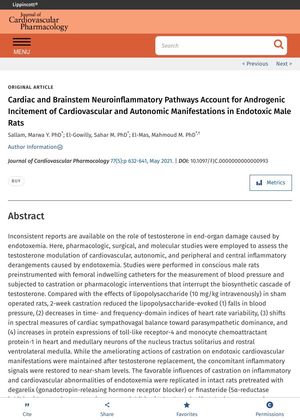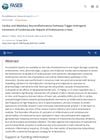Cardiac and Brainstem Neuroinflammatory Pathways Account for Androgenic Incitement of Cardiovascular and Autonomic Manifestations in Endotoxic Male Rats
April 2021
in “
Journal of Cardiovascular Pharmacology
”

TLDR Testosterone plays a big role in heart and nervous system damage caused by inflammation in male rats, suggesting that blocking testosterone production could help manage this condition.
The study investigated the role of testosterone in end-organ damage caused by endotoxemia in male rats. The researchers used pharmacologic, surgical, and molecular studies to assess the testosterone modulation of cardiovascular, autonomic, and inflammatory derangements caused by endotoxemia. The study found that castration reduced the negative effects of lipopolysaccharide, including falls in blood pressure, decreases in heart rate variability, shifts in cardiac sympathovagal balance, and increases in protein expressions of toll-like receptor-4 and monocyte chemoattractant protein-1 in heart and medullary neurons. These effects were maintained after testosterone replacement, and the inflammatory signals were restored to near-sham levels. The study concluded that androgens and their biosynthetic enzymes play a significant role in cardiovascular and autonomic insults induced by the endotoxic inflammatory response, suggesting that interrupting testosterone biosynthesis could be a potential strategy for managing endotoxemia.





